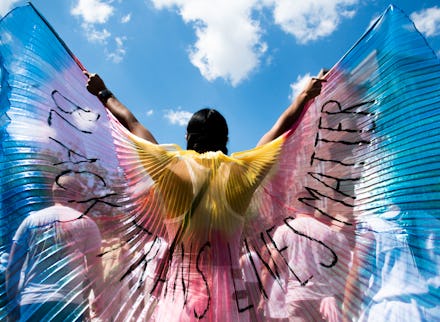Violence against Black trans women has spurred a new wave of protests

Following horrific violence against Black trans women in recent weeks, protests this weekend centered their stories and their lives. As demonstrations continue nationwide against white supremacy and the police killings of Black people, massive gatherings in Brooklyn, Los Angeles, and Chicago remembered Black trans women specifically — a population that is so often forgotten or ignored by the public and mainstream media.
On Sunday, nearly 15,000 people gathered in Brooklyn to protest the killings of Dominique "Rem'mie" Fells and Riah Milton. In both cases, the women were violently attacked, and their deaths are an all-too-common reminder that Black trans women face deadly racism, sexism, and trans-misogyny at higher rates than any other demographic. Experts call the murder of Black trans women an epidemic.
The organizers of Sunday's protest, The Okra Project and the Marsha P. Johnson Institute, asked protesters to wear white in honor of the 1917 NAACP Silent Protest Parade. "We felt that was a really powerful way to think about our action in relation to a lot of others," one of the rally's co-organizers, Fran Tirado, told CNN.
One of the rally's speakers was the sister of the late Layleen Cubilette-Polanco, who died in a Rikers Island solitary confinement cell on June 7 after suffering an epileptic attack. Polanco, a trans woman of color, had been held in pretrial detention because she could not afford to pay her $500 bail after being arrested on misdemeanor assault charges.
"Black trans lives matter," Melania Brown, Polanco's sister, told the crowd. "My sister's life mattered. All of the loved ones we have lost, all of these beautiful girls that we have lost. Their lives matter. We have to protect them."
The Philadelphia Office of LGBT Affairs released a statement after the murder of Fells, whose body was found in Philadelphia. "As thousands take to the streets to proclaim that Black Lives Matter, it is critical we remember that this includes Black trans lives. Dominique Rem’mie Fells’s life mattered," the statement said, noting that protests spurred by the police killings of George Floyd and Breonna Taylor have less frequently lifted up the names of Black trans people who have been killed in recent weeks, like Tony McDade, a Black trans man who was shot and killed by police in late May. The protest in Los Angeles, meanwhile, was dubbed the All Black Lives Matter protest, in recognition that Black trans women are often ignored and disregarded.
In 2019, at least 26 transgender or gender non-conforming people of color were killed, though the number may be higher due to police misgendering and deadnaming trans folks. This year, Milton is the 14th Black trans woman to have been killed. Overwhelmingly, Black trans women face this kind of violence, and they also generally receive the least resources and attention, whether it's investigating their deaths or working to prevent future anti-Black trans-misogyny.
And what resources are available, such as police, come at a cost for trans people. While Black trans women face high levels of violence from the public, they are also highly likely to report violence and harassment by police. The National Center for Transgender Equality found that 58% of transgender people faced harassment and abuse by police, and because of this they are less likely to report violence against them or ask for assistance.
On Monday, following the weekend's protests, the Supreme Court of ruled that LGBTQ workers are protected from employment discrimination under Title VII of the Civil Rights Act. The Human Rights Campaign reported on this connection between violence and job security: "Fatal violence disproportionately affects transgender women of color — particularly Black transgender women — and that the intersections of racism, sexism, homophobia, biphobia, transphobia and unchecked access to guns conspire to deprive them of employment, housing, health care, and other necessities." The ruling may go a way toward tackling the staggering rates of trans people who suffer from homelessness and combat job discrimination.
Raquel Willis, a trans writer and activist who helped organize Sunday's march, said, "At my first job, I was stealth out of survival. I wasn't out as trans because I was afraid of being fired. Today's [Supreme Court] ruling will encourage so many more folks to move beyond that fear."